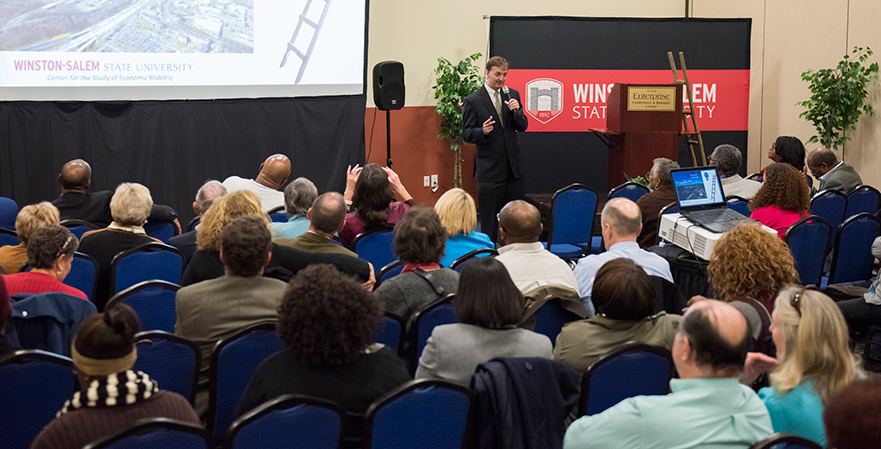Center for the Study of Economic Mobility announces first faculty research fellows

Winston-Salem State University’s new Center for the Study of Economic Mobility (CSEM) awarded $60,000 in research grants during its first public event on Thursday, Nov. 16.
The grants, which support four faculty/student research projects, will focus on identifying the barriers to economic mobility in Forsyth County.
“Our first faculty research fellows illustrate the unique multidisciplinary approach we are taking with the Center for the Study of Economic Mobility. We’re pulling from the talents of WSSU faculty from five academic disciplines,” said Dr. Craig Richardson, founder of CSEM. “This also will give people here in the community a flavor of how research begins, as experts come together to tackle one of Winston-Salem’s biggest concerns. CSEM has the potential to have real-world impact on citizens, business and government.”
These four grants of $15,000 each were awarded and will be completed in summer 2018:
- Dr. Michelle K. Lewis, associate professor of psychology and co-chair of the Department of Psychological Sciences
Research question: Are optimal decision-making and motivation compromised by poverty? A cultural neuroscience framework for emancipation and empowerment - Dr. Zagros Madjd-Sadjadi, economic professor
Research question: Place prosperity vs. People Prosperity: An investigation into changing industrial and occupational structures in Forsyth County - Dr. Alice Etim, associate professor of management information systems and interim chair of the Department of Accounting and Management Information Systems; and Dr. James Etim, education professor
Research question: Within Forsyth County, what impact does education, information and community technology have on socioeconomic status? - Dr. Greg Taylor, associate professor of business analytics
Research question: What is the impact of the local bankruptcy system in developing economic mobility?
Also during the event, Richardson announced that CSEM will partner with Diana Greene, a Winston-Salem-based writer and filmmaker, to produce a short documentary film that will tell the personal story of the obstacles facing a resident commuting to work by bus. It will center on the challenges of climbing the economic ladder when job choices are often limited by bus routes and long commute times.
In September, WSSU received a $3 million grant to launch a new center, that will fund research for five years. CSEM will serve as a hub for faculty research, undergraduate student research, scholarship and community outreach. The grant is from the Thurgood Marshall College Fund’s Center for Advancing Opportunity, an initiative supported by The Charles Koch Foundation and Koch Industries.
Children from low-income families in Forsyth County are less likely to move up the income ladder as adults compared to kids almost anywhere else in the United States, according to a study by economist Raj Chetty. Only two counties in South Dakota are worse. Even residents in neighboring counties Yadkin, Stokes and Surry have better economic mobility outcomes.
About 100 city, business and faith leaders, along with WSSU faculty and staff attended the open house, held at the Enterprise Center, the new home for CSEM.
A WSSU advisory committee evaluated a number of WSSU faculty research proposals and passed their recommendations to Richardson and Alvin Atkinson, the associate director of CSEM, who used this data to make their final decisions for the five research fellows.
Among the speakers at the open house was WSSU senior Rasheeda Shankle, who overcame poverty as a single mother in East Winston and has founded a non-profit that focuses on rebuilding communities. Shankle will graduate from WSSU in December.
“I became a statistic, a product of my environment,” Shankle said. “I became depressed because I knew it was not the life I wanted to live. One day I asked myself, ‘Rasheeda, if your life were a book, and you were an author, how would you want your story to be told?’ And that basically changed my life forever. With the support of my family, I was able to overcome those obstacles and climb the ladder of opportunities.”
Those interested in receiving updates from CSEM, are encouraged to fill out an online survey at www.wssu.edu/csem.
A bold past. A brilliant future.
For 125 years, Winston-Salem State University has fostered the creative thinking, analytical problem-solving, and depth of character needed to transform the world. Rooted in liberal education, WSSU’s curriculum prepares students to be thought leaders who have the skills and knowledge needed to develop innovative solutions to complex problems. WSSU is a historically Black constituent institution of the University of North Carolina with a rich tradition of contributing to the social, cultural, intellectual, and economic growth of North Carolina, the region and beyond. Guided by the motto, “Enter to Learn. Depart to Serve,” WSSU develops leaders who advance social justice by serving the world with compassion and commitment. Join us in celebrating our 125th anniversary with events throughout 2017.
About the Center for Advancing Opportunity
The Center for Advancing Opportunity expands educational, social, and economic opportunities in our nation’s most fragile communities through original research, educational programs, and direct engagement with residents. By listening to different community voices and supporting scholars and students passionate about making a positive difference, we work to empower people eager to put ideas into action and discover mutually beneficial solutions to bolster fragile communities across the country. Headquartered in Washington, D.C., the Center for Advancing Opportunity is a research and education initiative born out of a partnership with the Thurgood Marshall College Fund, the Charles Koch Foundation, and Koch Industries. The Center supports students and faculty at Historically Black Colleges and Universities (HBCUs) as well as other majority colleges and universities to develop research-based solutions to the most pressing issues in fragile communities.
For more information about the Center for Advancing Opportunity, visit www.advancingopportunity.org.
